Murray Bookchin Famous Quotes
Reading Murray Bookchin quotes, download and share images of famous quotes by Murray Bookchin. Righ click to see or save pictures of Murray Bookchin quotes that you can use as your wallpaper for free.
Broadly conceived, however, ecology deals with the balance of nature. Inasmuch as nature includes man, the science basically deals with the harmonization of nature and man. This focus has explosive implications. The explosive implications of an ecological approach arise not only from the fact that ecology is intrinsically a critical science--in fact, critical on a scale that the most radical systems of political economy failed to attain--but it is also an integrative and reconstructive science.
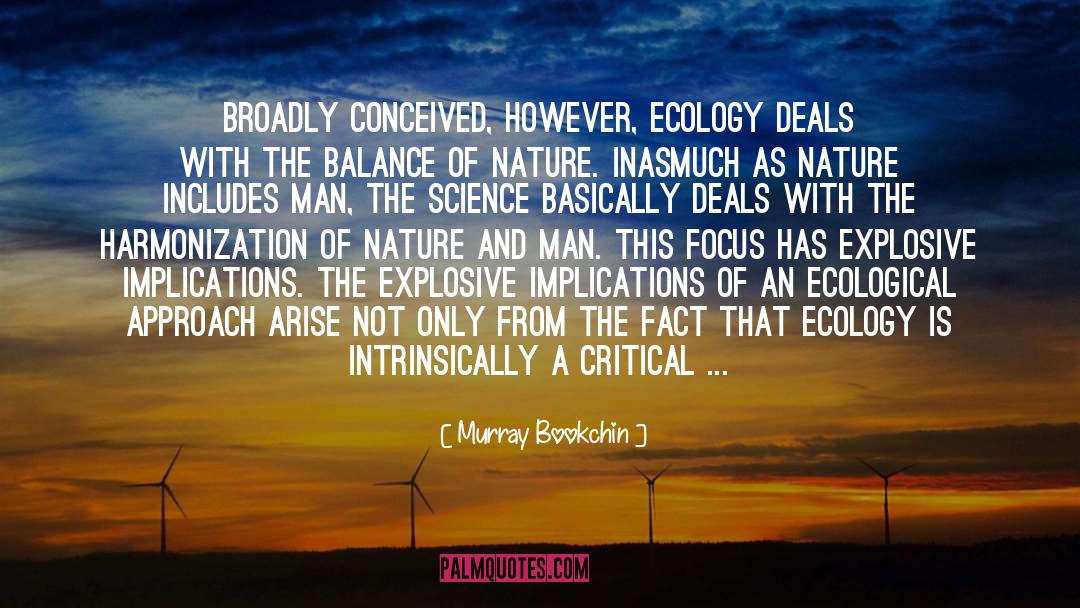
Until recently, attempts to resolve the contradictions created by urbanization, centralization, bureaucratic growth and statification were viewed as a vain counterdrift to "progress" - a counterdrift that could be dismissed as chimerical and reactionary. The anarchist was regarded as a forlorn visionary, a social outcast, filled with nostalgia for the peasant village or the medieval commune. His yearnings for a decentralized society and for a humanistic community at one with nature and the needs of the individual - the spontaneous individual, unfettered by authority - were viewed as the reactions of a romantic, of a declassed craftsman or an intellectual "misfit." His protest against centralization and statification seemed all the less persuasive because it was supported primarily by ethical considerations - by Utopian, ostensibly "unrealistic," notions of what man could be, not by what he was. In response to this protest, opponents of anarchist thought - liberals, rightists and authoritarian "leftists" - argued that they were the voices of historic reality, that their statist and centralist notions were rooted in the objective, practical world.
Time is not very kind to the conflict of ideas. Whatever may have been the validity of libertarian and non-libertarian views a few years ago, historical development has rendered virtually all objections to anarchist thought meaningless today. The modern city and state, the massive coal-steel technology of the Industrial Revoluti
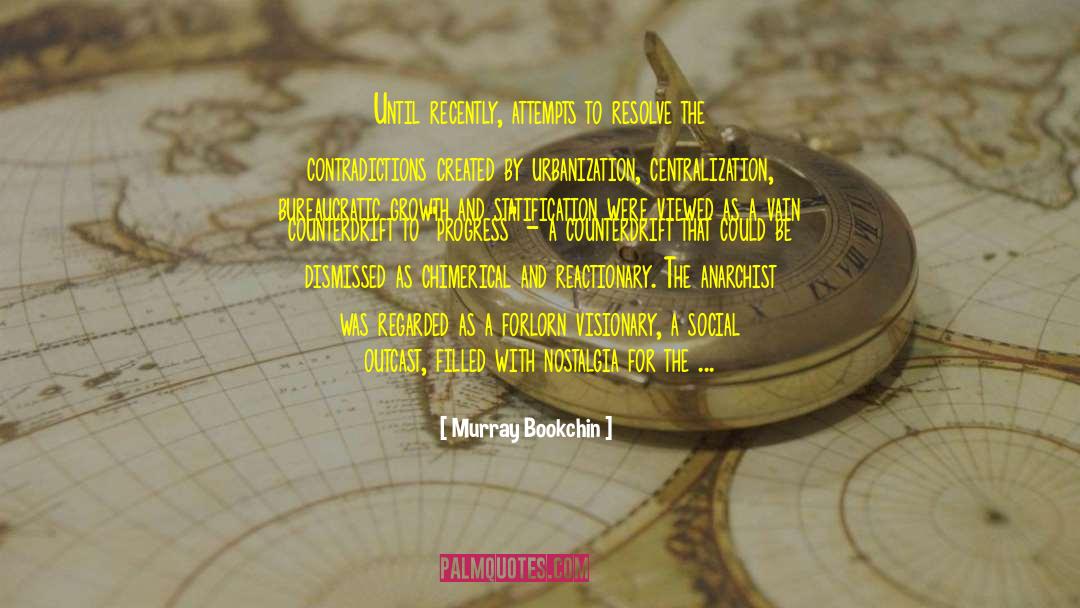
An anarchist society, far from being a remote ideal, has become a precondition for the practice of ecological principles.
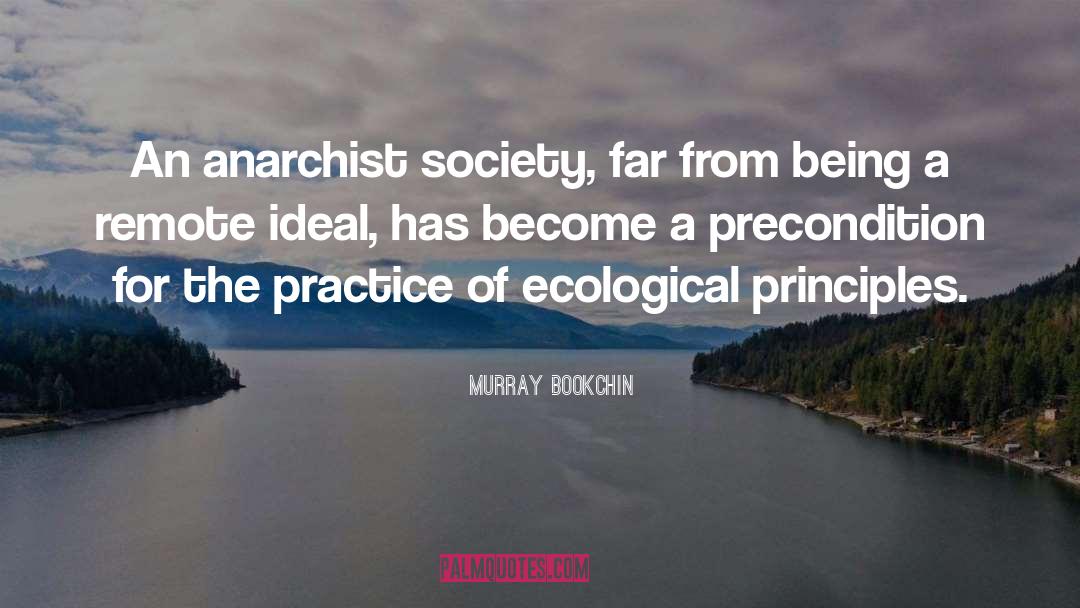
By contrast, the traditional revolutionary demand for council forms of organization (what Hannah Arendt describes as "the revolutionary heritage") does not break completely with the terrain of hierarchical society. Workers' councils originate as class councils. Unless one assumes that workers are driven by their interests as workers to revolutionary measures against hierarchical society (an assumption I flatly deny), then these councils can be used just as much to perpetuate class society as to destroy it. We shall see, in fact, that the council form contains many structural limitations which favor the development of hierarchy. For the present, it suffices to say that most advocates of workers' councils tend to conceive of people primarily as economic entities, either as workers or nonworkers. This conception leaves the onesidedness of the self completely intact. Man is viewed as a bifurcated being, the product of a social development that divides man from man and each man from himself.
Nor is this one-sided view completely corrected by demands for workers' management of production and the shortening of the work week, for these demands leave the nature of the work process and the quality of the worker's free time completely untouched. If workers' councils and workers' management of production do not transform the work into a joyful activity, free time into a marvelous experience, and the workplace into a community, then they remain merely formal structures, in fact, cla
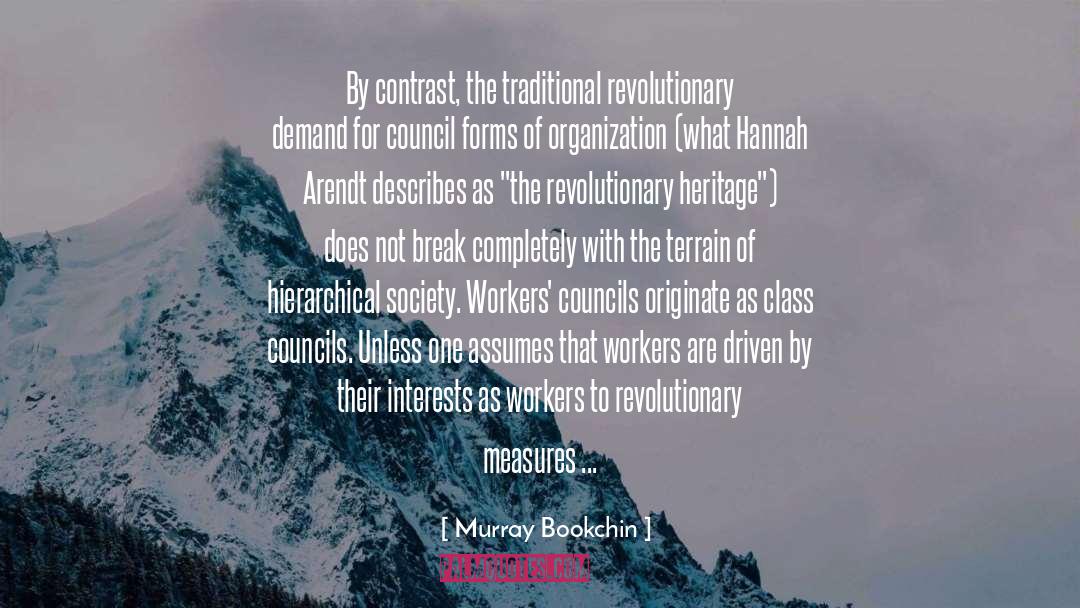
Humanity has passed through a long history of one-sidedness and of a social condition that has always contained the potential of destruction, despite its creative achievements in technology. The great project of our time must be to open the other eye: to see all-sidedly and wholly, to heal and transcend the cleavage between humanity and nature that came with early wisdom.
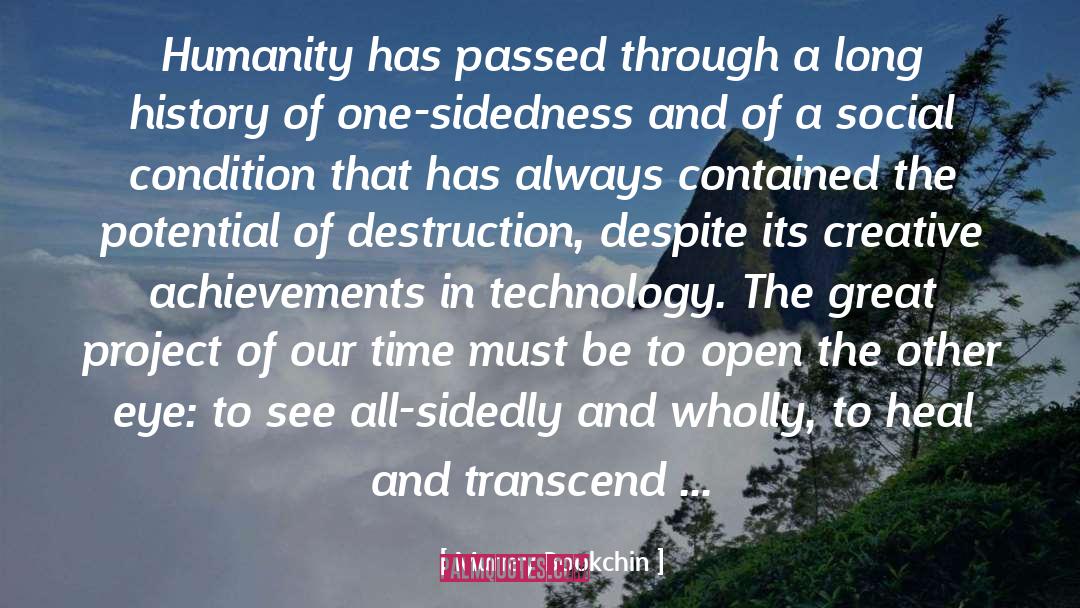
What solidarity we do find exists despite the society, against all its realities, as an unending struggle between the innate decency of man and the innate indecency of the society. Can we imagine how men would behave if this decency could find full release, if society earned the respect, even the love of the individual?
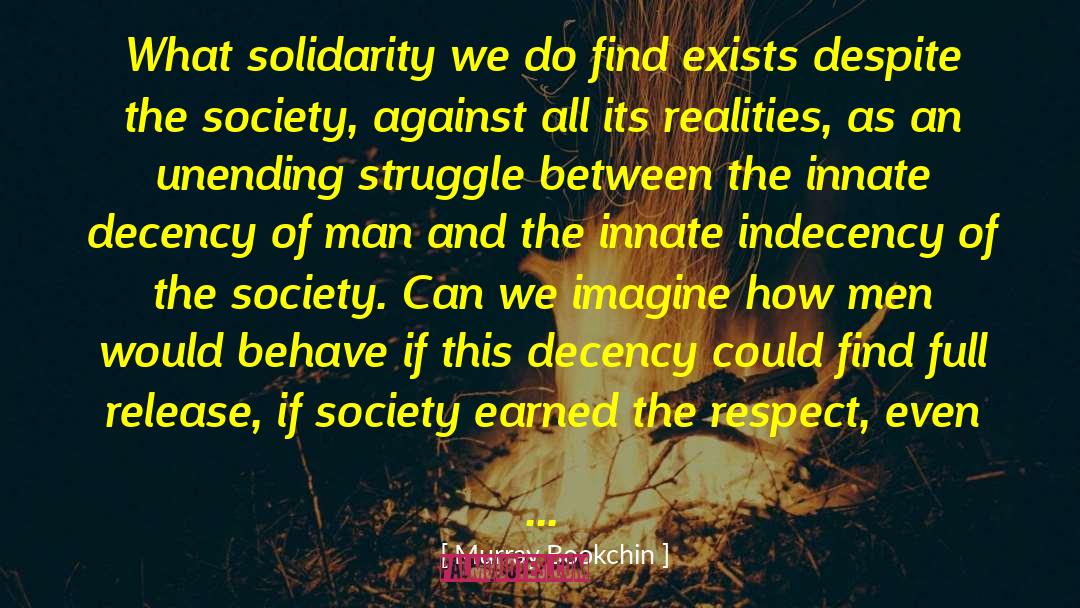
We have permitted cynical political reactionaries and the spokesmen of large corporations to pre-empt these basic libertarian American ideals. We have permitted them not only to become the specious "voice" of these ideals such that individualism has been used to justify egotism; the "pursuit of happiness" to justify greed, and even our emphasis on local and regional autonomy has been used to justify parochialism, insularism, and exclusivity -- often against ethnic minorities and so-called "deviant" individuals. We have even permitted these reactionaries to stake out a claim to the word "libertarian," a word, in fact, that was literally devised in the 1890s in France by Elisée Reclus as a substitute for the word "anarchist," which the government had rendered an illegal expression for identifying one's views. The propertarians, in effect -- acolytes of Ayn Rand, the "earth mother" of greed, egotism, and the virtues of property -- have appropriated expressions and traditions that should have been expressed by radicals but were willfully neglected because of the lure of European and Asian traditions of "socialism," "socialisms" that are now entering into decline in the very countries in which they originated.
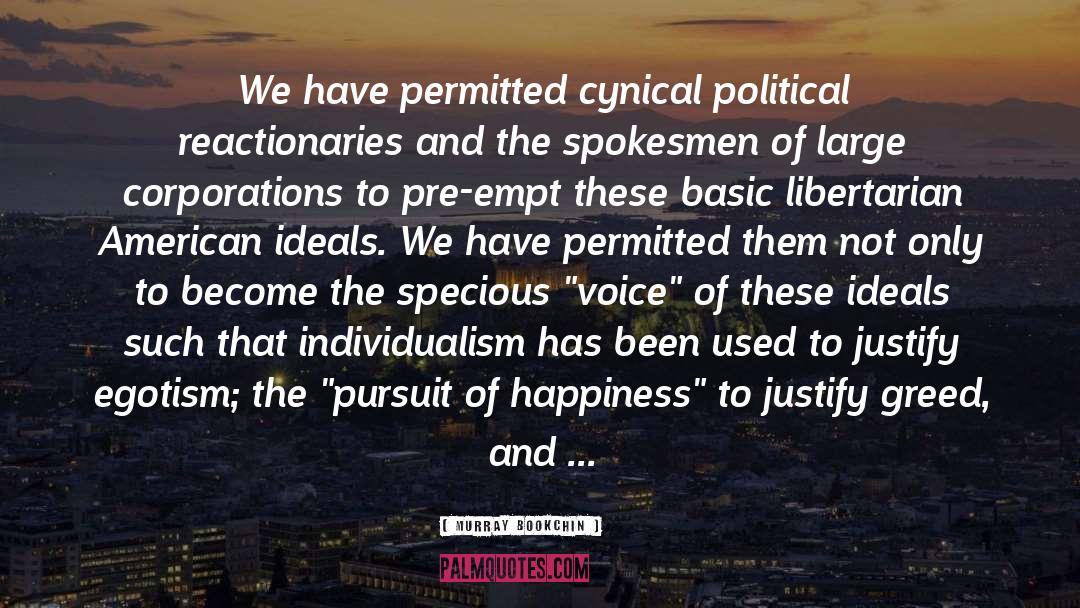
The truth is that man has produced imbalances not only in nature but more fundamentally in his relations with his fellow man--in the very structure of his society. To state this thought more precisely: the imbalances man has produced in the natural world are caused by the imbalances he has produced in the social world.
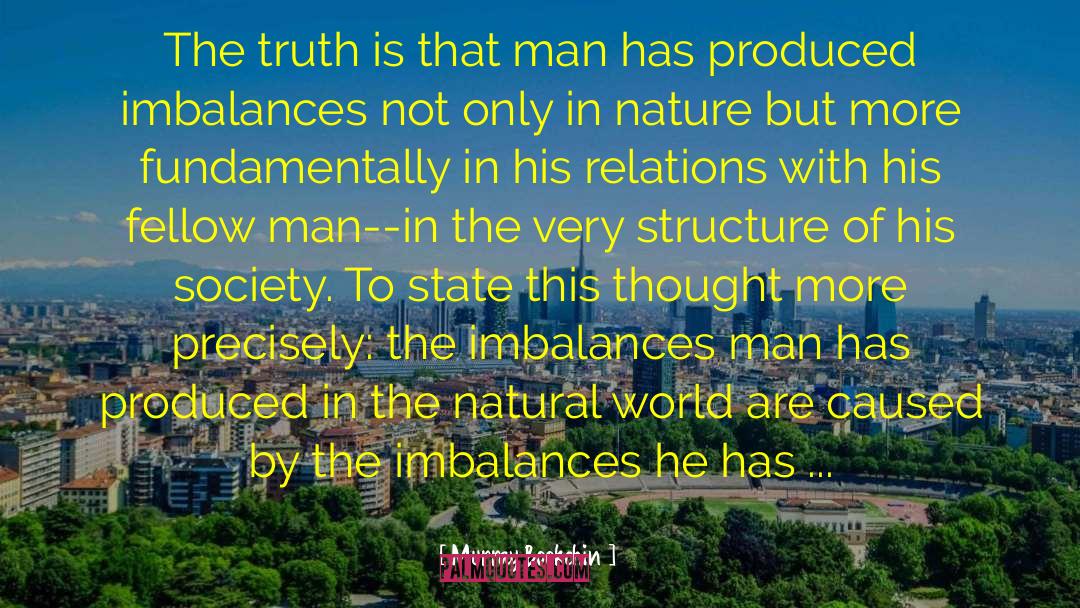
Any attempt to solve the ecological crisis within a bourgeois framework must be dismissed as chimerical. Capitalism is inherently anti-ecological. Competition and accumulation constitute its very law of life, a law … summarised in the phrase, 'production for the sake of production.' Anything, however hallowed or rare, 'has its price' and is fair game for the marketplace. In a society of this kind, nature is necessarily treated as a mere resource to be plundered and exploited. The destruction of the natural world, far being the result of mere hubristic blunders, follows inexorably from the very logic of capitalist production.
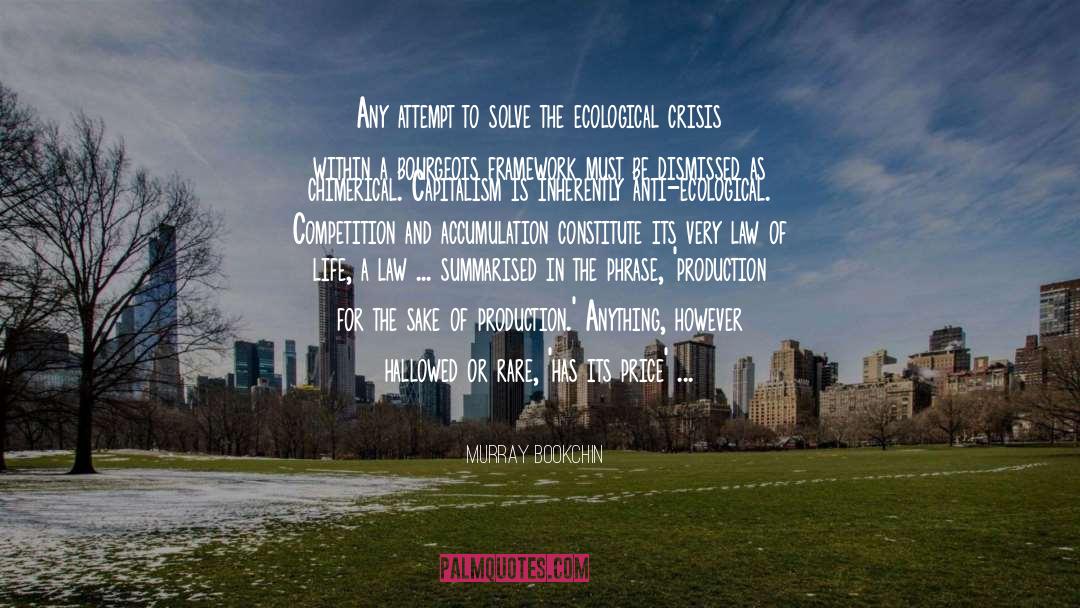
Capitalism is a compulsively expansive system. A modern market economy dictates that an enterprise must grow or die, and nothing will prevent capitalism from industrializing - more accurately, expanding - endlessly over the entire face of the planet whenever it is prepared to do so. Only the complete reconstruction of society and the economy can end the dilemmas that globalization raises - the exploitation of workers and the enhancement of corporate power to the point of threatening the stability, indeed the very safety, of the planet.
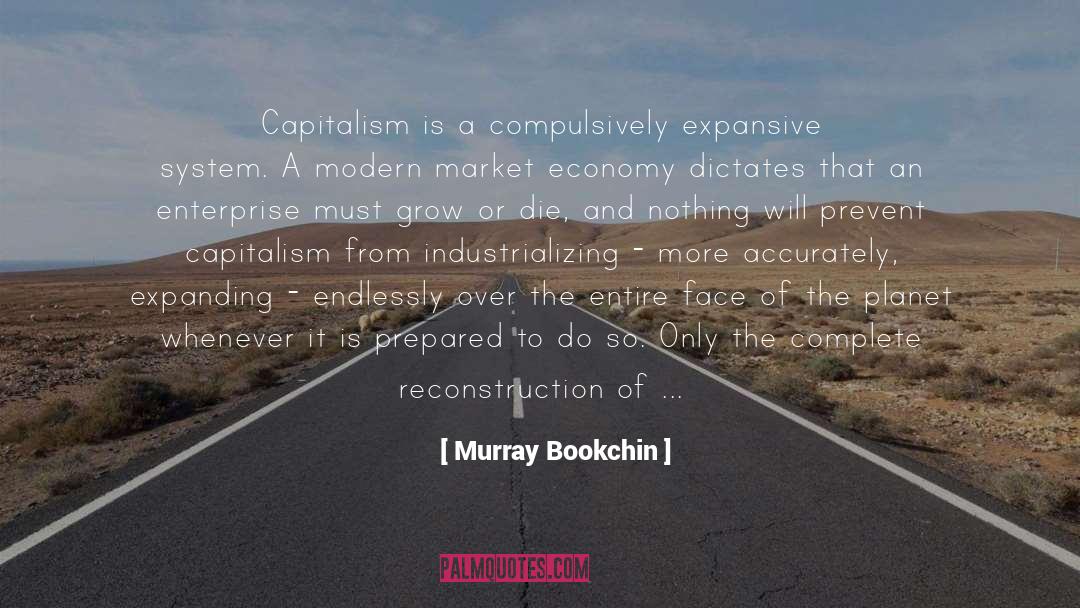
Nor do piecemeal steps however well intended, even partially resolve problems that have reached a universal, global and catastrophic character. If anything, partial 'solutions' serve merely as cosmetics to conceal the deep seated nature of the ecological crisis. They thereby deflect public attention and theoretical insight from an adequate understanding of the depth and scope of the necessary changes.
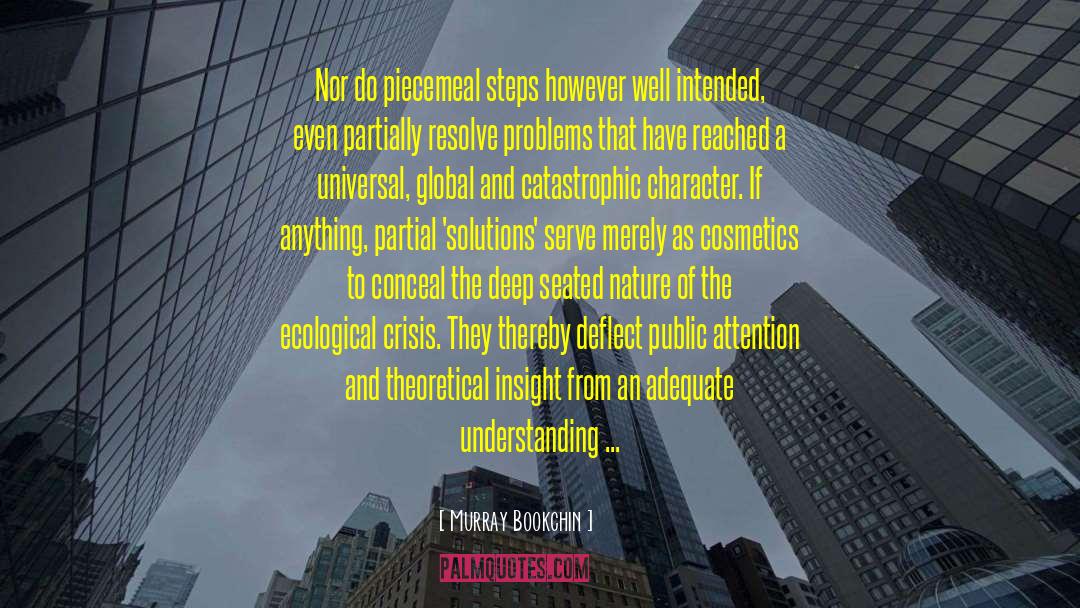
Too often, ideas meant to yield a certain practice are instead transported into the academy, as fare for 'enriching' a curriculum and, of course, generating jobs for the growing professoriat.
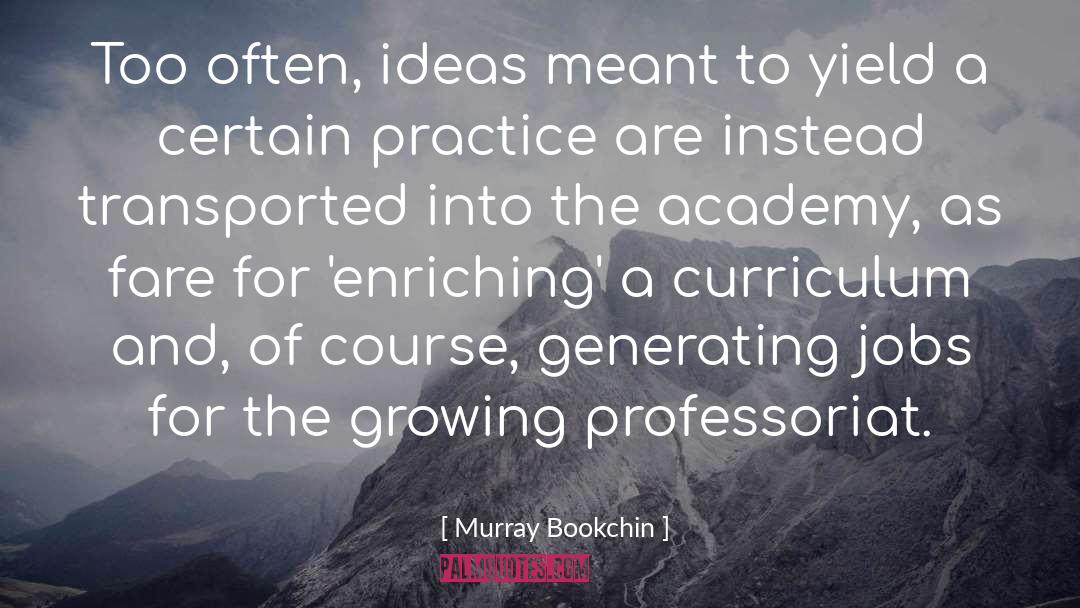
The notion of independence, which is often confused with independent thinking and freedom, has been so marbled by pure bourgeois egoism that we tend to forget that our individuality depends heavily on community support systems and solidarity. It is not by childishly subordinating ourselves to the community on the one hand or by detaching ourselves from it on the other that we become mature human beings. What distinguishes us as social beings, hopefully with rational institutions, from solitary beings who lack any serious affiliations, is our capacities for solidarity with one another, for mutually enhancing our self-development and creativity and attaining freedom within a socially creative and institutionally rich collectivity.
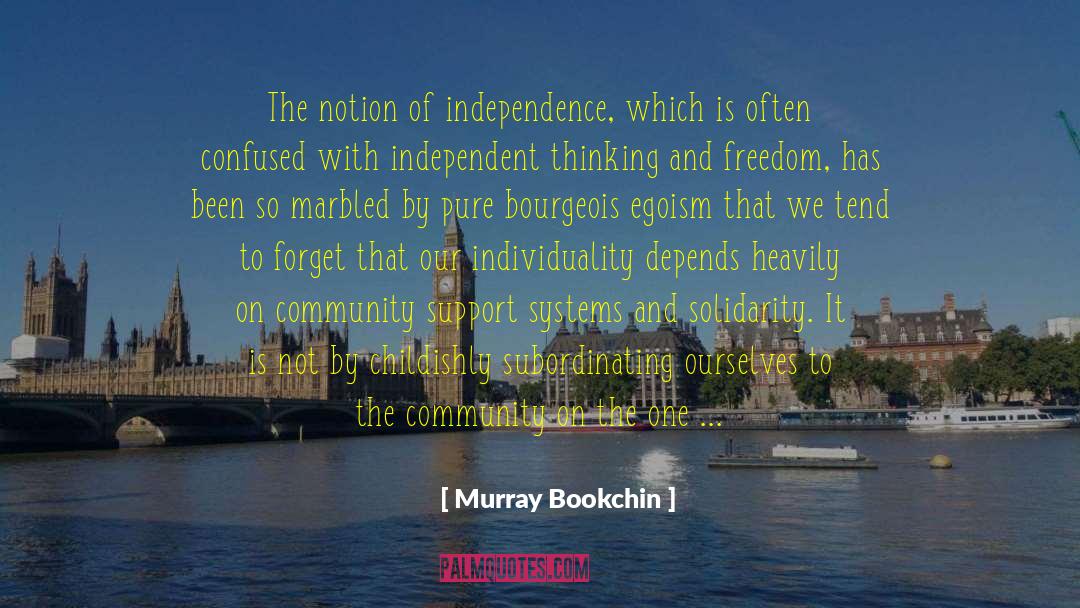
People are never free of trying to be content.
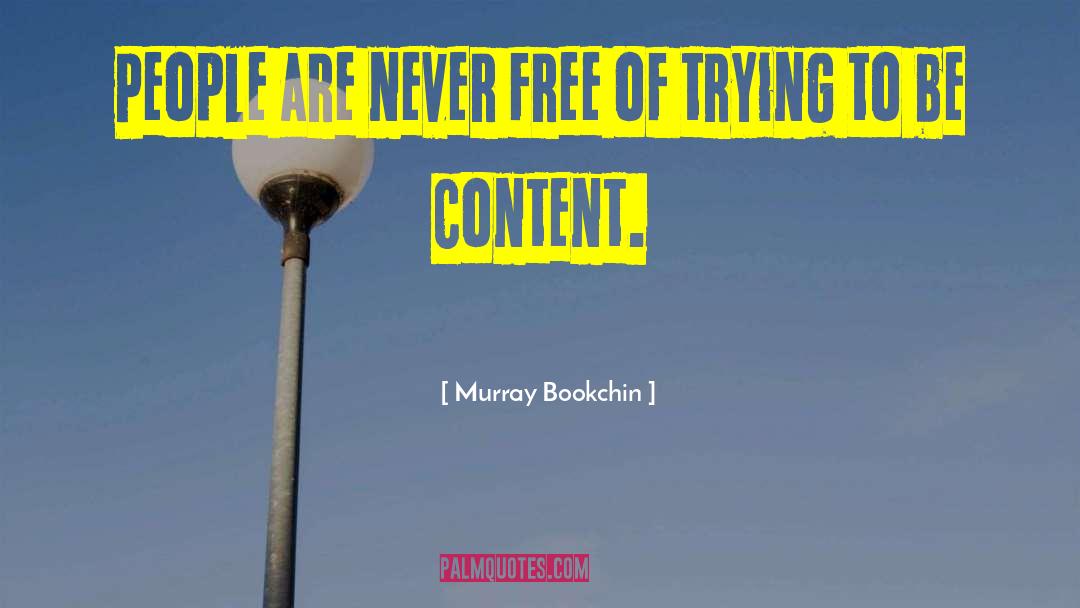
Peter Kropotkin described Anarchism as the extreme left wing of socialism - a view with which I completely agree. One of my deepest concerns today is that the libertarian socialist core will be eroded by fashionable, post- modernist, spiritualist, mystic individualism.

Social Ecology:
The notion that man must dominate nature emerges directly from the domination of man by man ... But it was not until organic community relation ... dissolved into market relationships that the planet itself was reduced to a resource for exploitation. This centuries-long tendency finds its most exacerbating development in modern capitalism. Owing to its inherently competitive nature, bourgeois society not only pits humans against each other, it also pits the mass of humanity against the natural world. Just as men are converted into commodities, so every aspect of nature is converted into a commodity, a resource to be manufactured and merchandised wantonly. ... The plundering of the human spirit by the market place is paralleled by the plundering of the earth by capital.
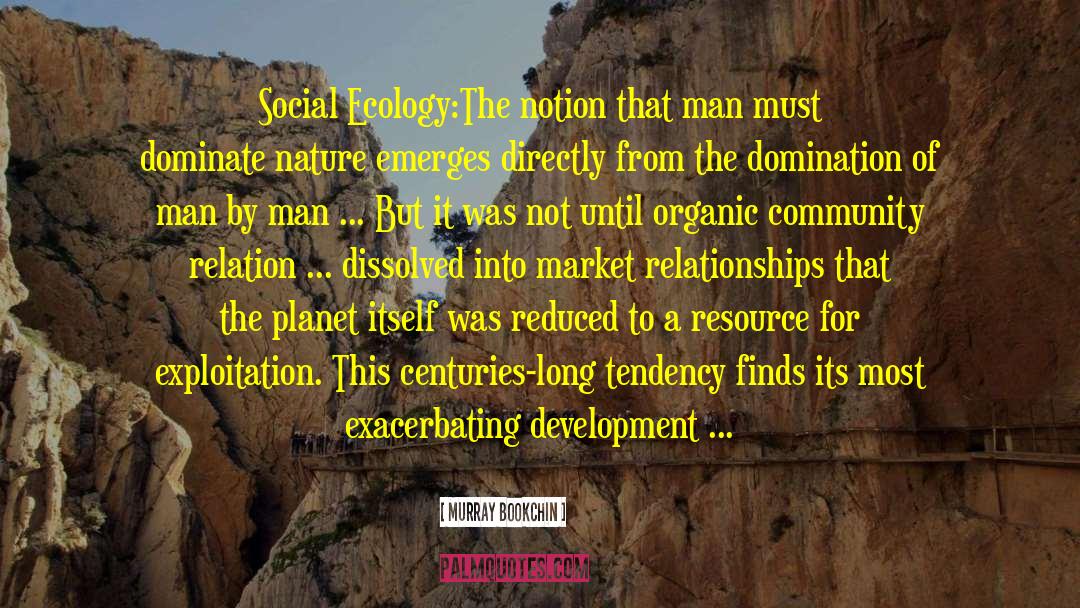
Revolutionary liberation must be a self-liberation that reaches social dimensions, not "mass liberation" or "class liberation" behind which lurks the rule of an elite, a hierarchy and a state.
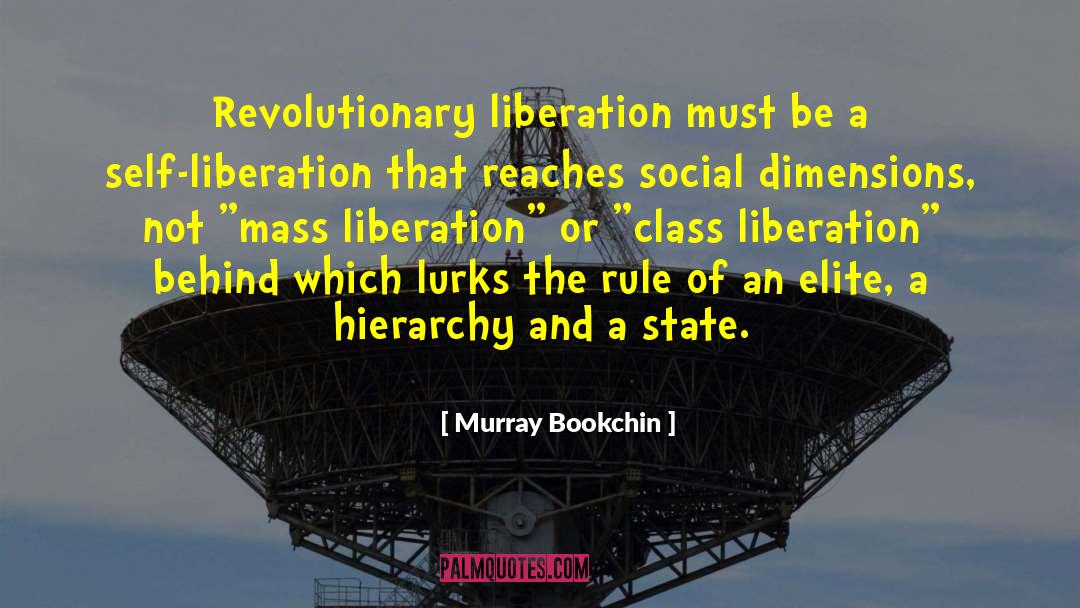
But capitalism has not stood still since Marx's day. Writing in the middle years of the nineteenth century, Marx could not be expected to grasp the full consequences of his insights into the centralization of capital and the development of technology. He could not be expected to foresee that capitalism would develop not only from mercantilism into the dominant industrial form of his day - from stateaided trading monopolies into highly competitive industrial units - but further, that with the centralization of capital, capitalism returns to its mercantilist origins on a higher level of development and reassumes the state-aided monopolistic form. The economy tends to merge with the state and capitalism begins to "plan" its development instead of leaving it exclusively to the interplay of competition and market forces. To be sure, the system does not abolish the traditional class struggle, but manages to contain it, using its immense technological resources to assimilate the most strategic sections of the working class.
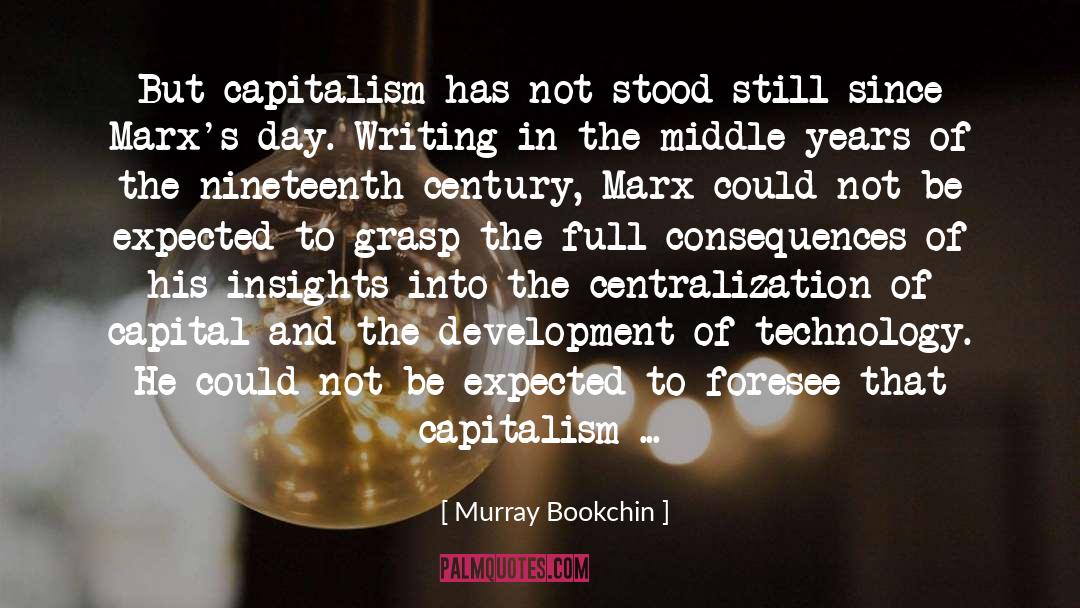
The middle and working classes no longer think of the present society as structured around classes. Current opinion holds that the rich are deserving and the poor are not, while an incalculable number of people linger between the categories. A huge section of public opinion in the Western world tends to regard oppression and exploitation as residual abuses, not inherent features of a specific social order. The prevailing society is neither rationally analyzed nor forcefully challenged; it is prudently psychoanalyzed and politely coaxed, as though social problems emerge from erratic individual behavior.
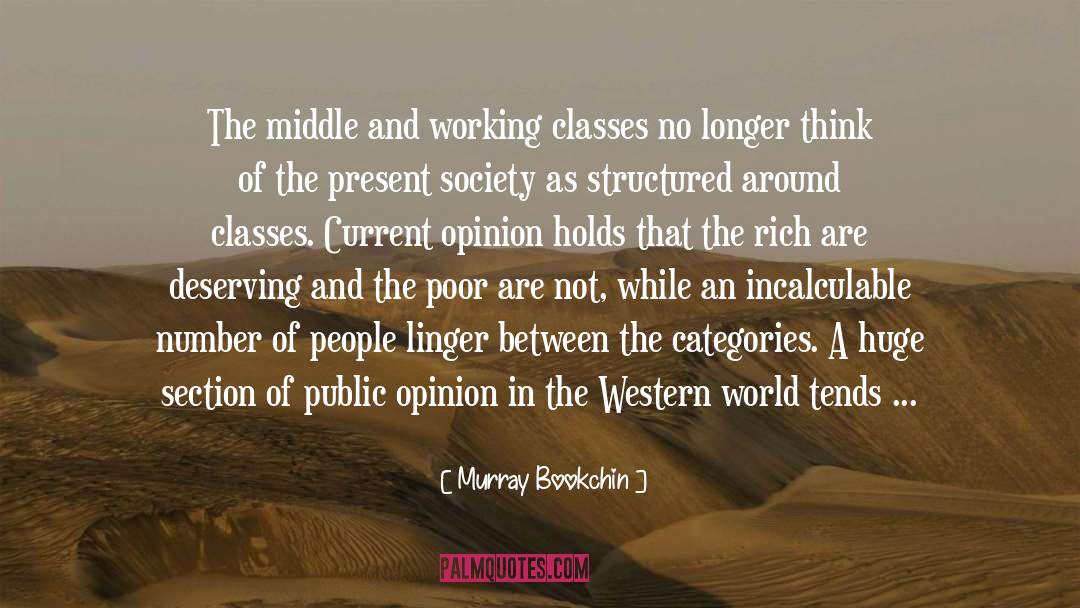
Finally, "industrial society," to use a genteel euphemism for capitalism, has also become an easy explanation for the environmental ills that afflict our time. But a blissful ignorance clouds the fact that several centuries ago, much of England's forest land, including Robin Hood's legendary haunts, was deforested by the crude axes of rural proletarians to produce charcoal for a technologically simple metallurgical economy and to clear land for profitable sheep runs. This occurred long before the Industrial Revolution.
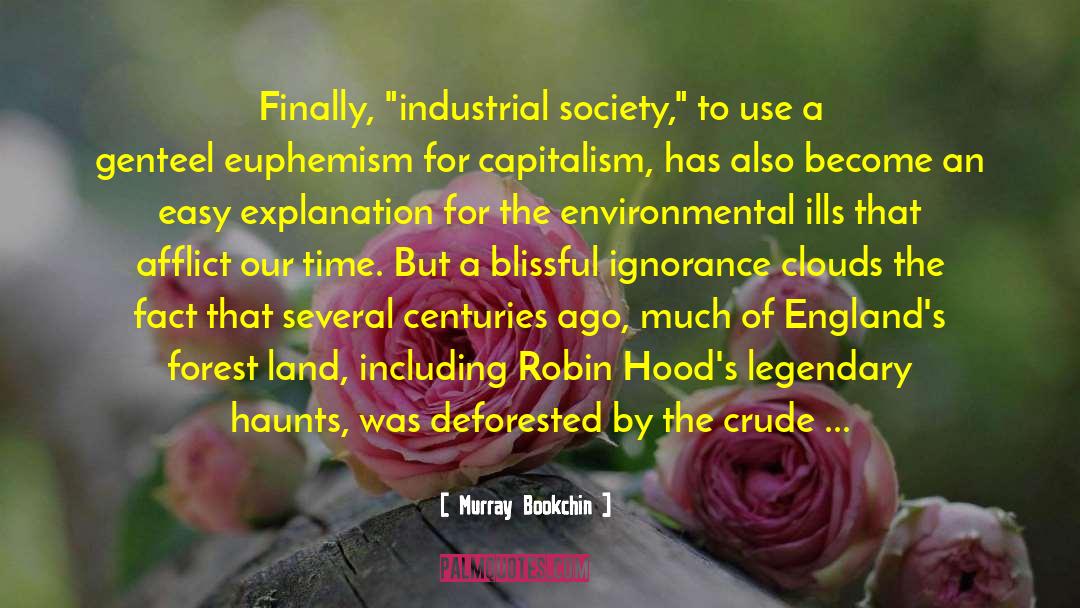
We must consciously create our own world, not according to mindless customs and destructive prejudices, but according to the canons of reason, reflection, and discourse that uniquely belong to our own species.
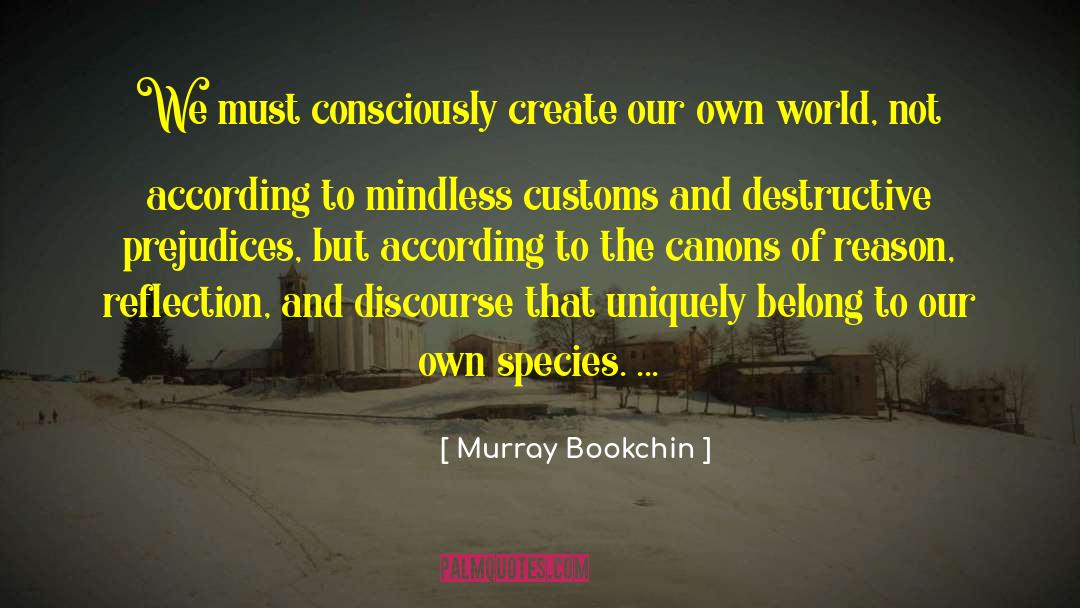
Issues such as gender discrimination, racism, and national chauvinism must be recast not only as cultural and social regressions but as evidence of the ills produced by hierarchy. A growing public awareness must be fostered in order to recognize that oppression includes not only exploitation but also domination, and that it is based not only on economic causes but on cultural particularisms that divide people according to sexual, ethnic, and similar traits.
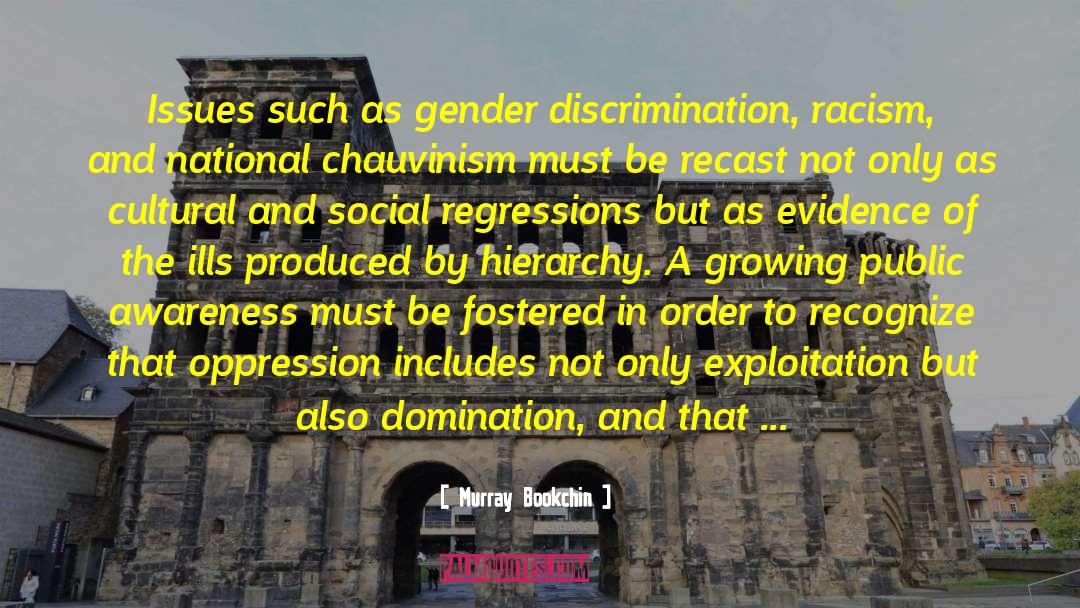
Modern society is incredibly complex, complex even beyond human comprehension, if we grant its premises - property, "production for the sake of production," competition, capital accumulation, exploitation, finance, centralization, coercion, bureaucracy and the domination of man by man. Linked to every one of these premises are the institutions that actualize it - offices, millions of "personnel," forms, immense tons of paper, desks, typewriters, telephones, and, of course, rows upon rows of filing cabinets. As in Kafka's novels, these things are real but strangely dreamlike, indefinable shadows on the social landscape. The economy has a greater reality to it and is easily mastered by the mind and senses, but it too is highly intricate - if we grant that buttons must be styled in a thousand different forms, textiles varied endlessly in kind and pattern to create the illusion of innovation and novelty, bathrooms filled to overflowing with a dazzling variety of pharmaceuticals and lotions, and kitchens cluttered with an endless number of imbecile appliances. If we single out of this odious garbage one or two goods of high quality in the more useful categories and if we eliminate the money economy, the state power, the credit system, the paperwork and the policework required to hold society in an enforced state of want, insecurity and domination, society would not only become reasonably human but also fairly simple.
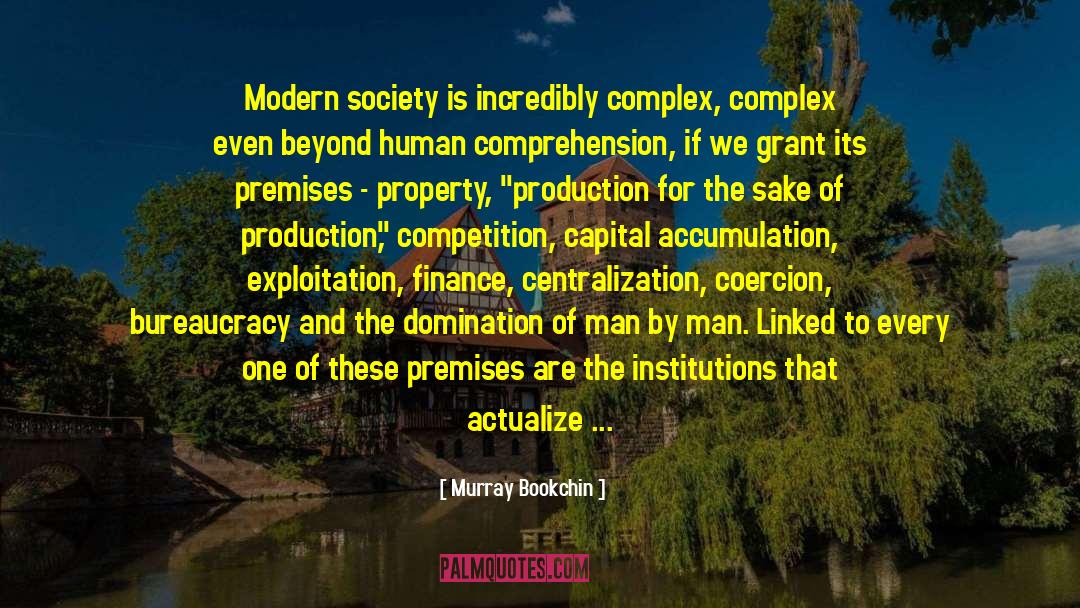
Actually, the urban dweller today is more isolated in the big city than his ancestors were in the countryside. The city man in the modern metropolis has reached a degree of anonymity, social atomization, and spiritual isolation that is virtually unprecedented in human history. Today man's alienation from man is almost absolute. His standards of co-operation, mutual aid, simple human hospitality, and decency have suffered an appalling amount of erosion in the urban milieu. Man's civic institutions have become cold, impersonal agencies for the manipulation of his destiny, and his culture has increasingly accommodated itself to the least common denominator of intelligence and taste.
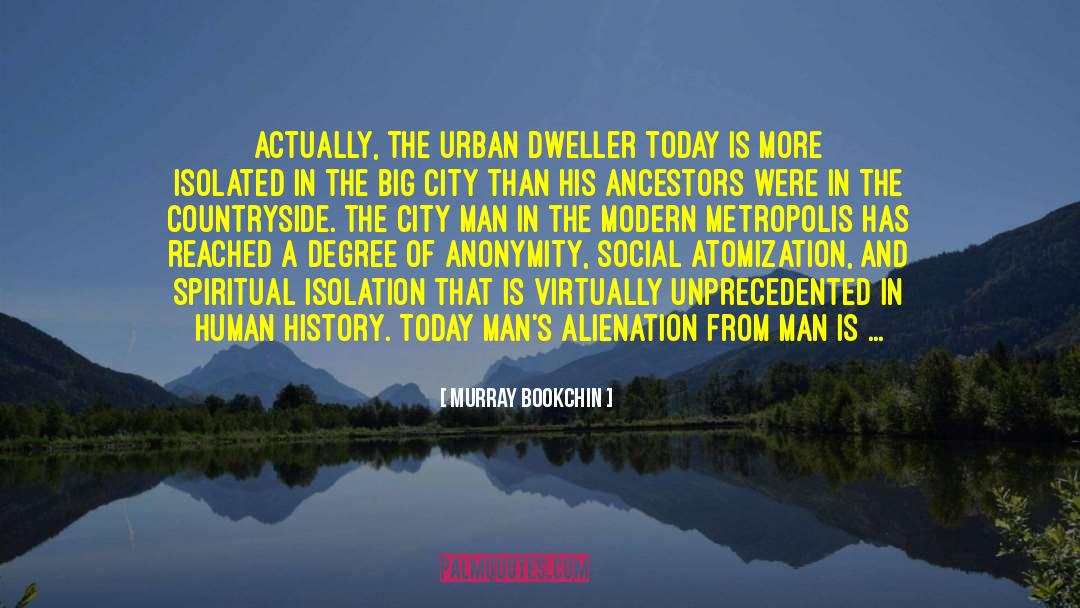
We are part of nature, a product of a long evolutionary journey. To some degree, we carry the ancient oceans in our blood. ... Our brains and nervous systems did not suddenly spring into existence without long antecedents in natural history. That which we most prize as integral to our humanity - our extraordinary capacity to think on complex conceptual levels - can be traced back to the nerve network of primitive invertebrates, the ganglia of a mollusk, the spinal cord of a fish, the brain of an amphibian, and the cerebral cortex of a primate.
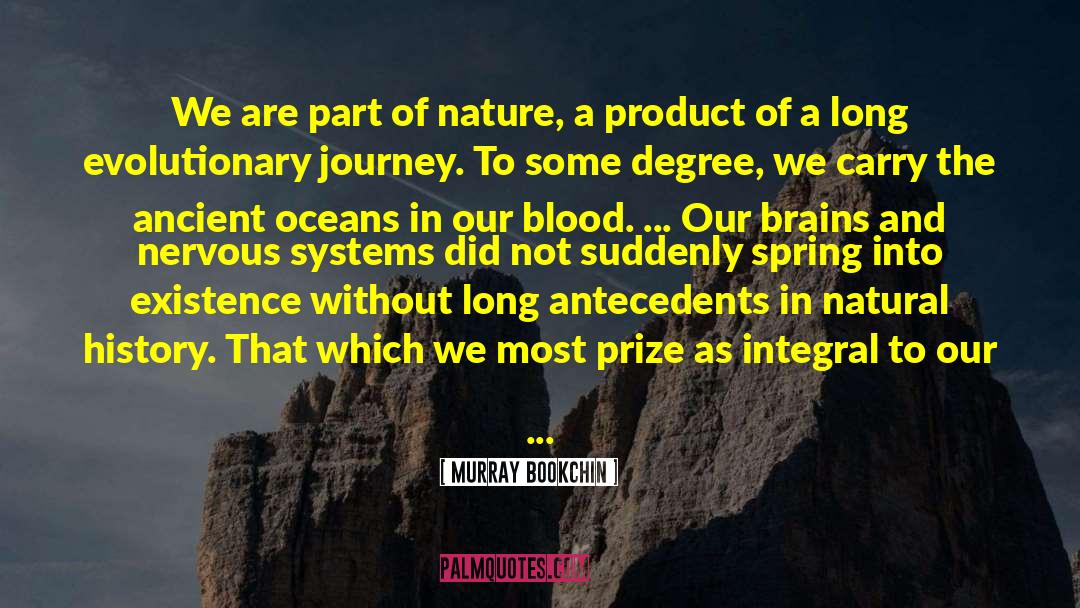
The social view of humanity, namely that of social ecology, focuses primarily on the historic emergence of hierarchy and the need to eliminate hierarchical relationships. It emphasizes the just demands of the oppressed in a society that wantonly exploits human beings, and it calls for their freedom. It explores the possibility or a new technology and a new sensibility, including more organic forms of reason, that will harmonize our relationship with nature instead of opposing society to the natural world.
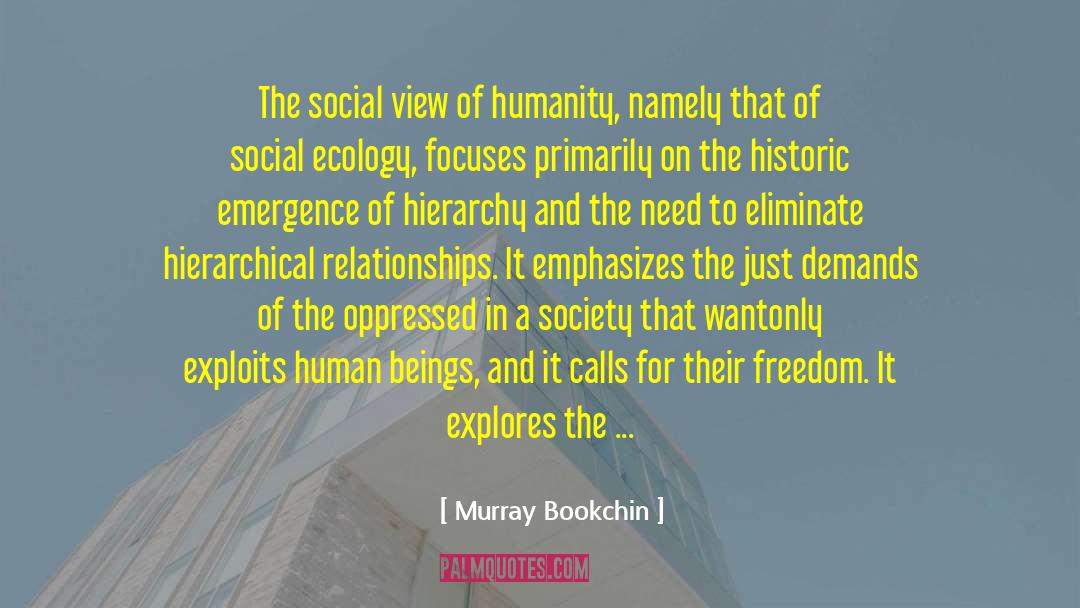
With the hollowing out of community by the market system, with its loss of structure, articulation, and form, comes the concomitant hollowing out of personality itself. Just as the spiritual and institutional ties that linked human beings together into vibrant social relations are eroded by the mass market, so the sinews that make for subjectivity, character, and self-definition are divested of form and meaning. The isolated, seemingly autonomous ego that bourgeois society celebrated as the highest achievement of "modernity" turns out to be the mere husk of a once fairly rounded individual whose very completeness as an ego was responsible because he or she was rooted in a fairly rounded and complete community.
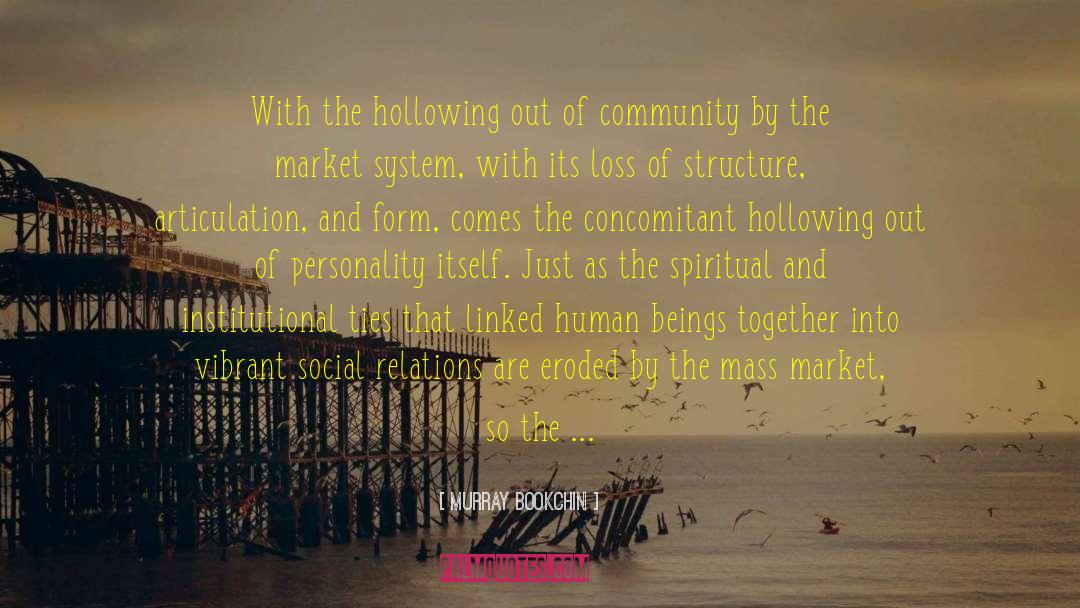
Until we become the architects of a society that is truly free and ecological, it will always seem that when the human brain is not adaptive, it is more often destructive than creative.
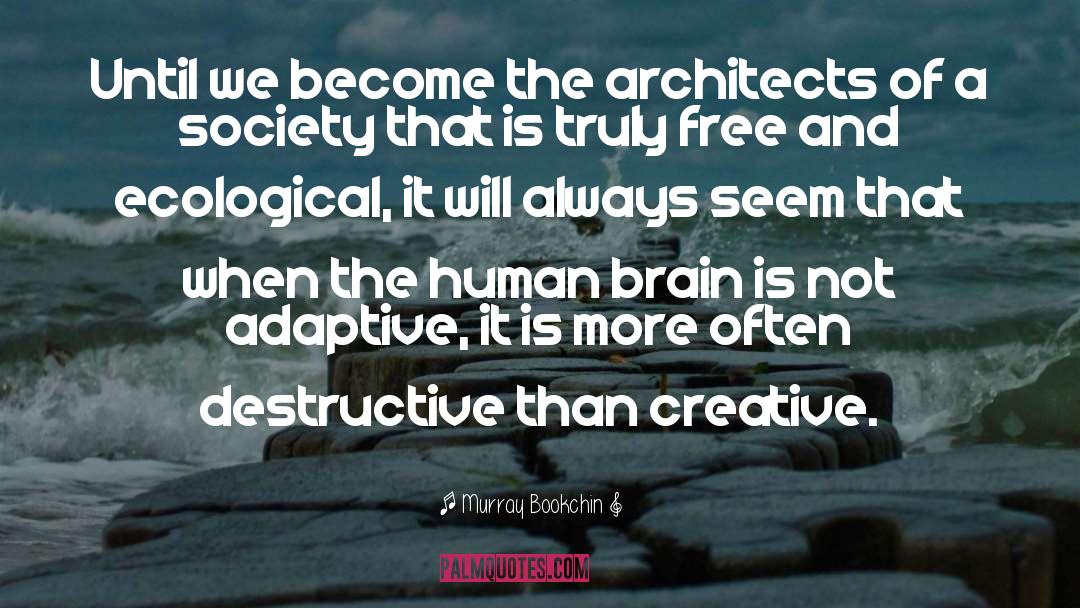
[The] term 'libertarian' itself, to be sure, raises a problem, notably, the specious identification of an anti-authoritarian ideology with a straggling movement for 'pure capitalism' and 'free trade.' This movement never created the word: it appropriated it from the anarchist movement of the [nineteenth] century. And it should be recovered by those anti-authoritarians ... who try to speak for dominated people as a whole, not for personal egotists who identify freedom with entrepreneurship and profit.
![Murray Bookchin Quotes: [The] term 'libertarian' itself, to Murray Bookchin Quotes: [The] term 'libertarian' itself, to](https://palmquotes.com/author/murray-bookchin-quotes-1586849.jpg)
Pages could be written on the immense losses of productive soil that occur annually in almost every continent of the earth; on lethal air pollution episodes in major urban areas; on the worldwide distribution of toxic agents, such as radioactive isotopes and lead; on the chemicalization of man's immediate environment - one might say his very dinner table - with pesticide residues and food additives. Pieced together like bits of a jigsaw puzzle, these affronts to the environment form a pattern of destruction that has no precedent in man's long history on earth.
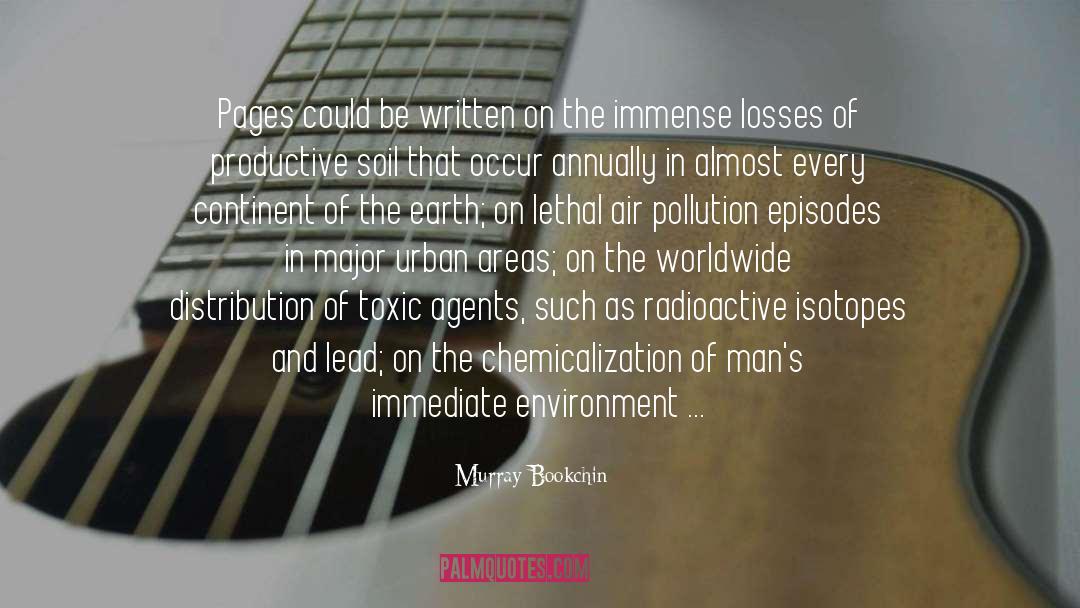
Until society can be reclaimed by an undivided humanity that will use its collective wisdom, cultural achievements, technological innovations, scientific knowledge, and innate creativity for its own benefit and for that of the natural world, all ecological problems will have their roots in social problems.
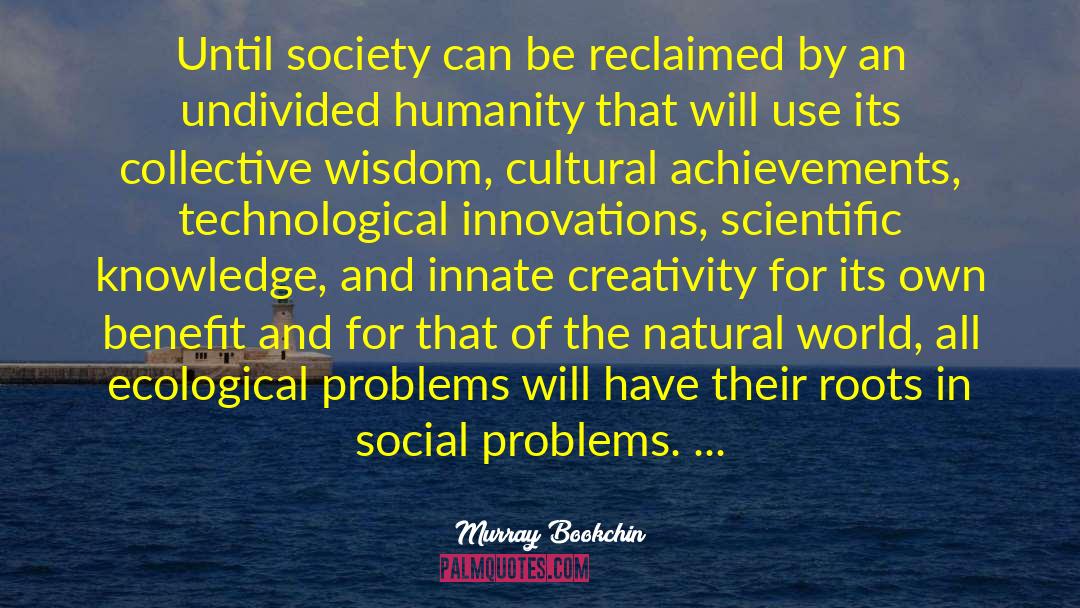
Ecologically, bourgeois exploitation and manipulation are undermining the very capacity of the earth to sustain advanced forms of life. The crisis is being heightened by massive increases in air and water pollution; by a mounting accumulation of nondegradable wastes, lead residues, pesticide residues and toxic additives in food; by the expansion of cities into vast urban belts; by increasing stresses due to congestion, noise and mass living; and by the wanton scarring of the earth as a result of mining operations, lumbering, and real estate speculation. As a result, the earth has been despoiled in a few decades on a scale that is unprecedented in the entire history of human habitation of the planet.
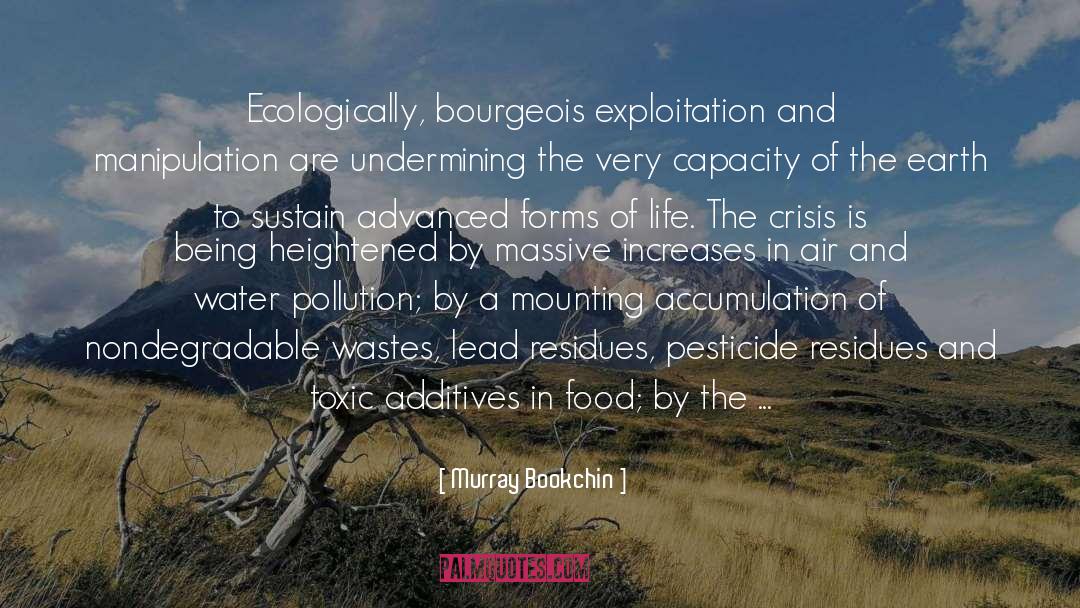
The truth, indeed, is out - but the ears to hear it and the minds to learn from it seem to have been atrophied by a cultivated ignorance and a nearly total loss of critical insight.
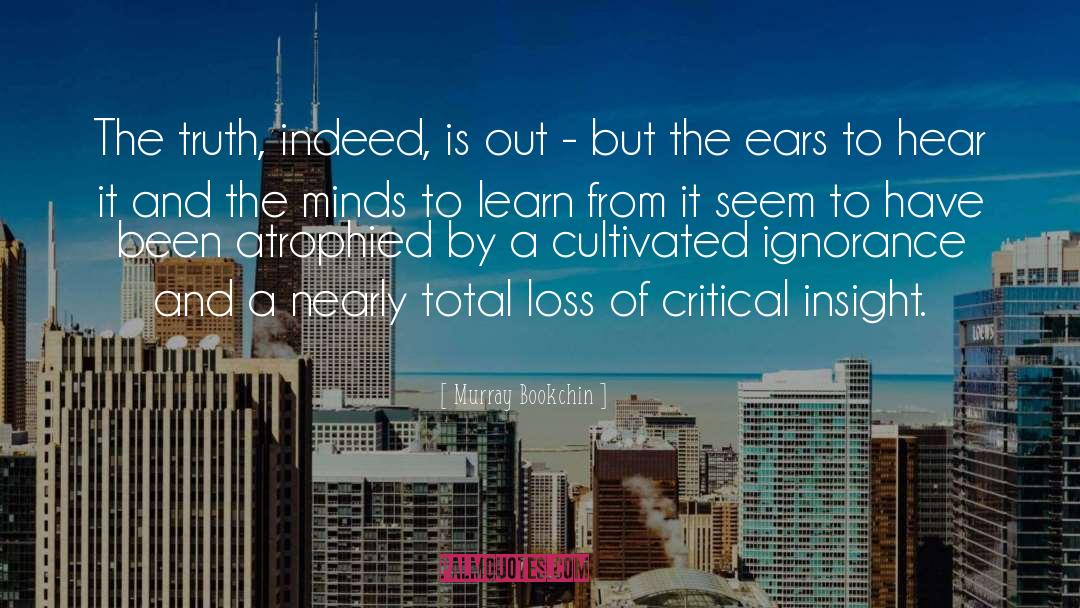
Our modern cities have become in large part agglomerations of bedroom apartments in which men and women spiritually wither away and their personalities become trivialized by the petty concerns of amusement, consumption, and small talk.
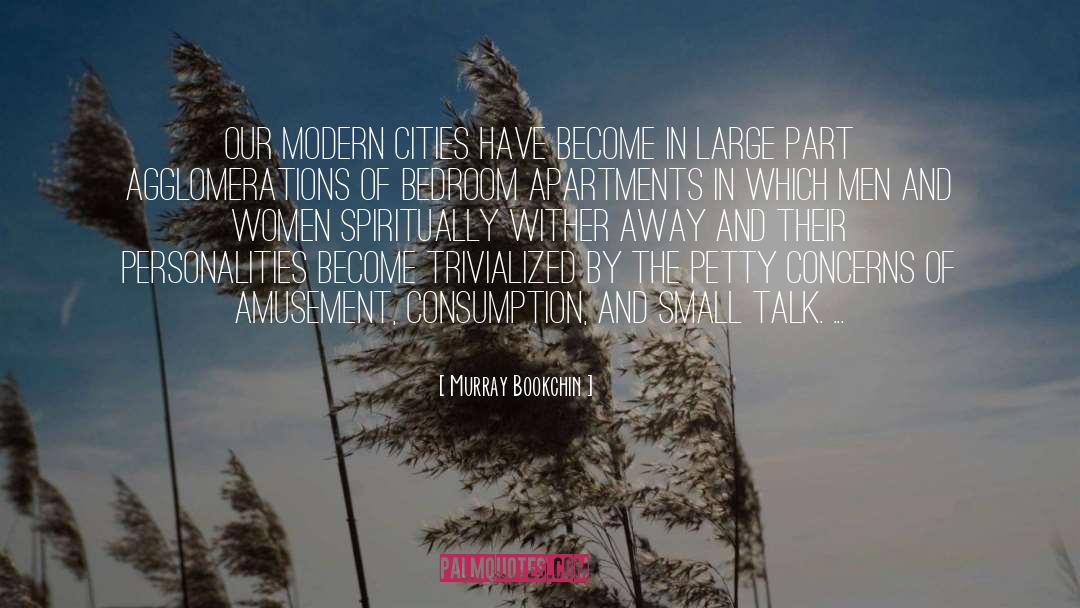
If we recognise that every ecosystem can also be viewed as a food web, we can think of it as a circular, interlacing nexus of plant animal relationships (rather than a stratified pyramid with man at the apex) ... Each species, be it a form of bacteria or deer, is knitted together in a network of interdependence, however indirect the links may be.
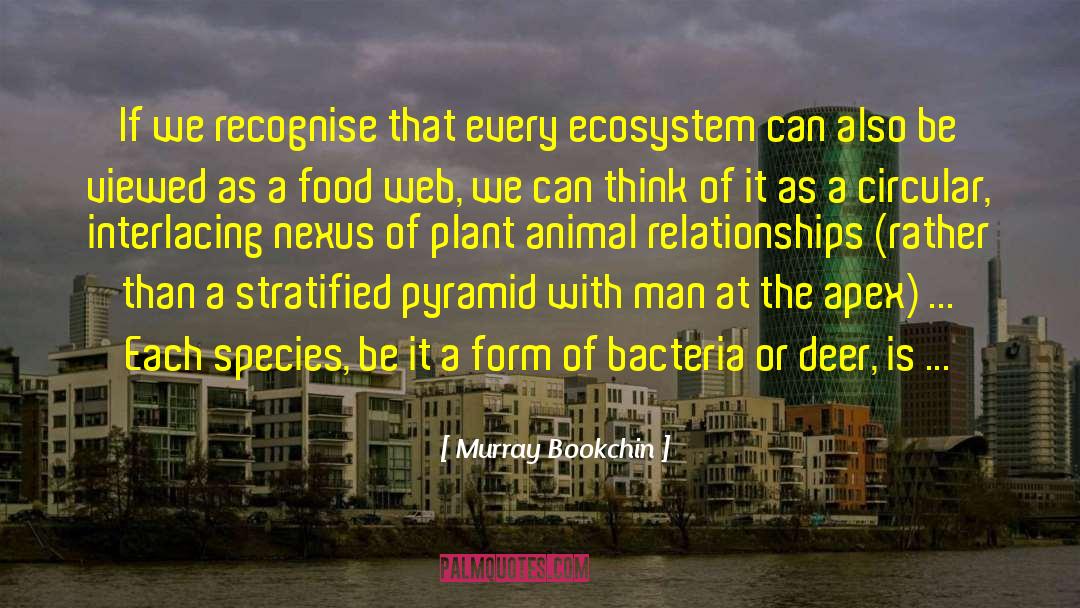
I am puzzled by people today who, after moralizing about the need for cooperation and goodwill and love-thy-neighbor-as-thyself, suddenly invoke the most primitive, barbarous motivations for any kind of progress.
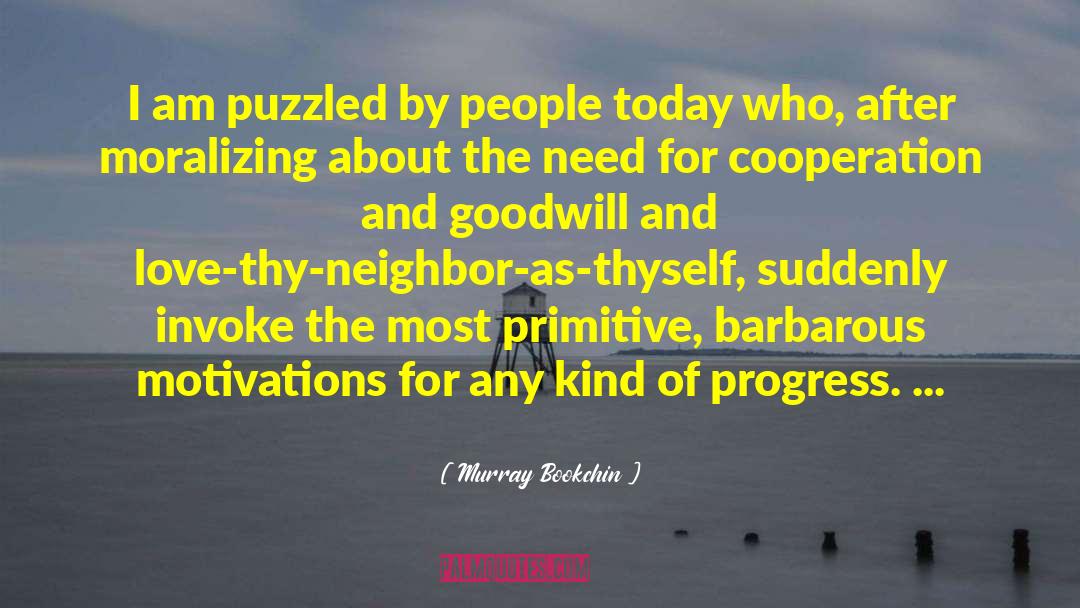
Unless we realize that the present market society, structured around the brutally competitive imperative of "grow or die," is a thoroughly impersonal, self-operating mechanism, we will falsely tend to blame technology as such or population growth as such for environmental problems. We will ignore their root causes, such as trade for profit, industrial expansion, and the identification of "progress" with corporate self-interest. In short, we will tend to focus on the symptoms of a grim social pathology rather than on the pathology itself, and our efforts will be directed toward limited goals whose attainment is more cosmetic than curative.
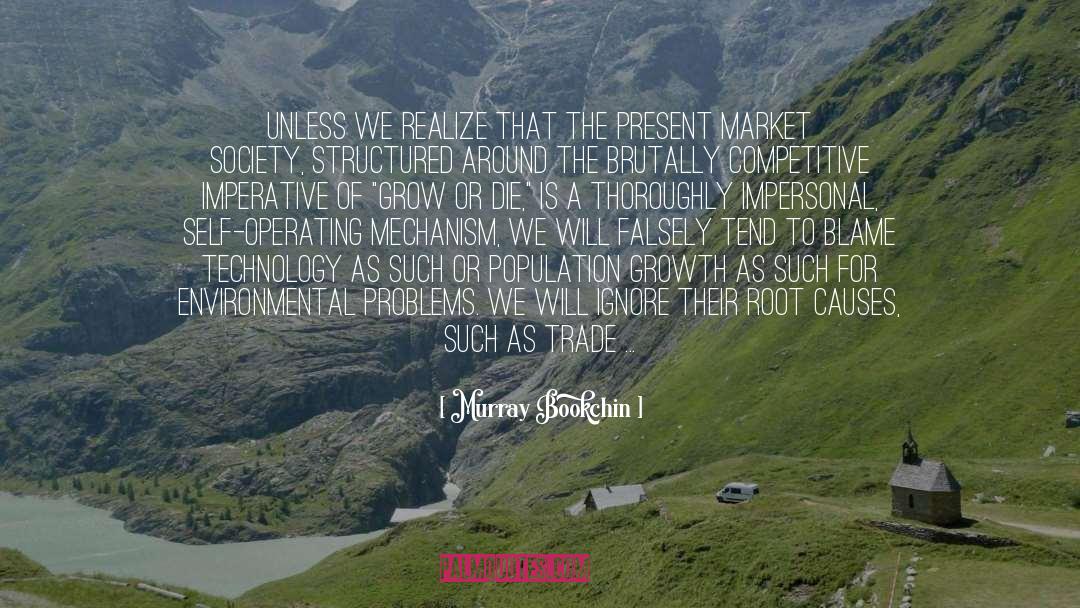
If the ecological community is ever achieved in practice, social life will yield a sensitive development of human and natural diversity, falling together into a well balanced, harmonious whole. Ranging from community through region to entire continents, we will see a colorful differentiation of human groups and ecosystems, each developing its unique potentialities and exposing members of the community to a wide spectrum of economic, cultural and behavioral stimuli. Falling within our purview will be an exciting, often dramatic, variety of communal forms - here marked by architectural and industrial adaptations to semi-arid ecosystems, there to grasslands, elsewhere by adaptation to forested areas. We will witness a creative interplay between individual and group , community and environment, humanity and nature. The cast of mind that today organizes differences among humans and other lifeforms along hierarchical lines, defining the external in terms of its "superiority" or "inferiority," will give way to an outlook that deals with diversity in an ecological manner. Differences among people will be respected, indeed fostered, as elements that enrich the unity of experience and phenomena. The traditional relationship which pits subject against object will be altered qualitatively; the "external," the "different," the "other" will be conceived of as individual parts of a whole all the richer because of its complexity. This sense of unity will reflect the harmonization of interest
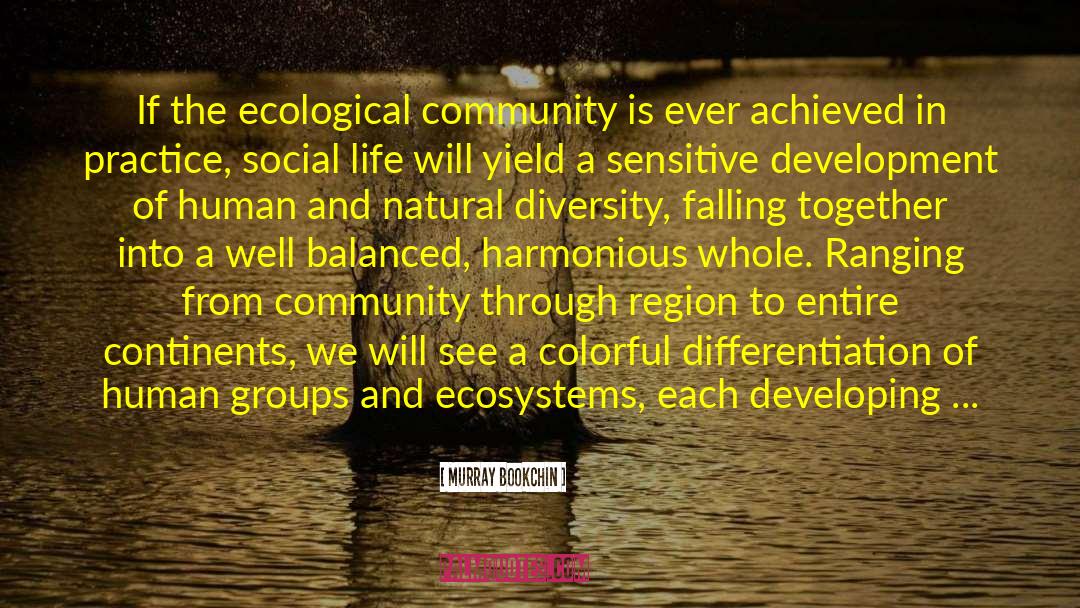
The process of simplifying man's environment and rendering it increasingly elemental and crude has a cultural as well as a physical dimension. The need to manipulate immense urban populations - to transport, feed, employ, educate and somehow entertain millions of densely concentrated people - leads to a crucial decline in civic and social standards. A mass concept of human relations - totalitarian, centralistic and regimented in orientation - tends to dominate the more individuated concepts of the past. Bureaucratic techniques of social management tend to replace humanistic approaches. All that is spontaneous, creative and individuated is circumscribed by the standardized, the regulated and the massified. The space of the individual is steadily narrowed by restrictions imposed upon him by a faceless, impersonal social apparatus. Any recognition of unique personal qualities is increasingly surrendered to the manipulation of the lowest common denominator of the mass. A quantitative, statistical approach, a beehive manner of dealing with man, tends to triumph over the precious individualized and qualitative approach which places the strongest emphasis on personal uniqueness, free expression and cultural complexity.
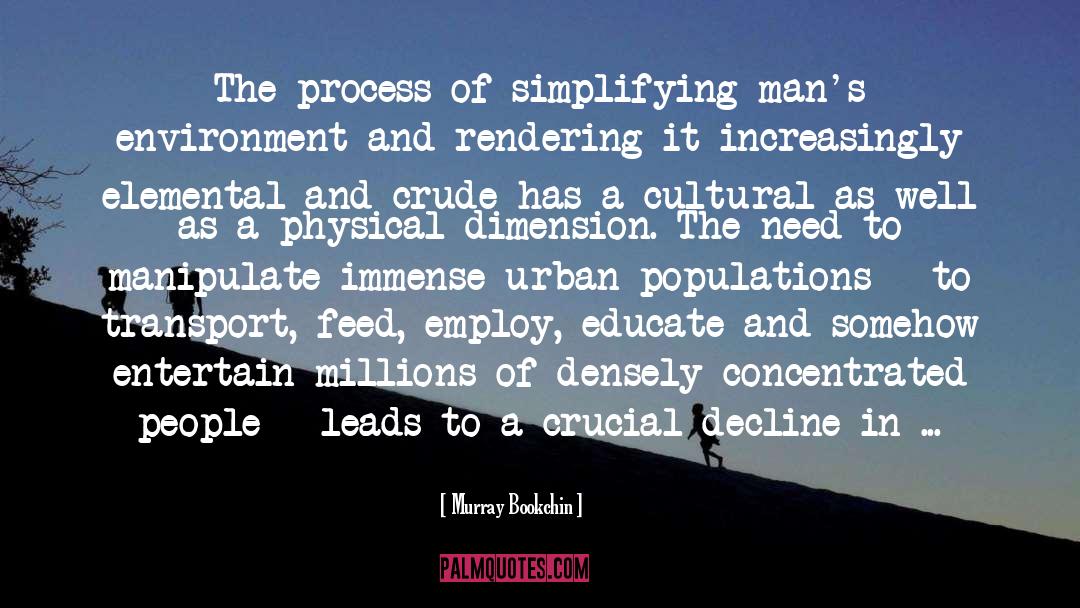
Capitalism, far from affording "privileges" to the middle classes, tends to degrade them more abjectly than any other stratum in society. The system deploys its capacity for abundance to bring the petty bourgeois into complicity with his own oppression - first by turning him into a commodity, into an object for sale in the marketplace; next by assimilating his very wants to the commodity nexus. Tyrannized as he is by every vicissitude of bourgeois society, the whole personality of the petty bourgeois vibrates with insecurity. His soporifics - commodities and more commodities - are his very poison. In this sense there is nothing more oppressive than "privilege" today, for the deepest recesses of the "privileged" man's psyche are fair game for exploitation and domination.
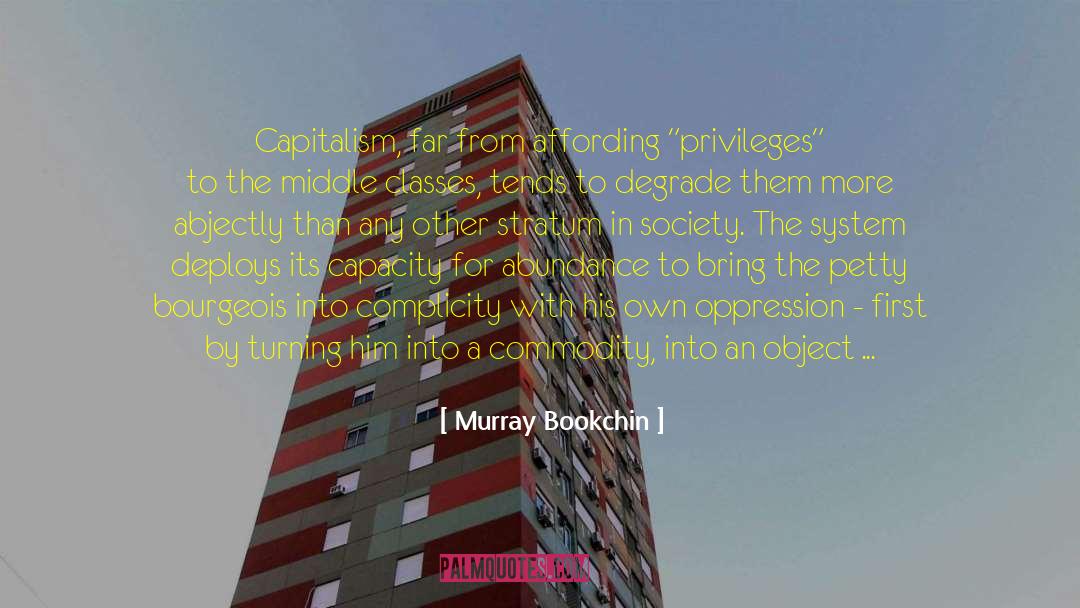
Limitation of scope, however, could represent a profound advantage from an ecological point of view. The sun, the wind and the earth are experiential realities to which men have responded sensuously and reverently from time immemorial. Out of these primal elements man developed his sense of dependence on - and respect for - the natural environment, a dependence that kept his destructive activities in check. The Industrial Revolution and the urbanized world that followed obscured nature's role in human experience - hiding the sun with a pall of smoke, blocking the winds with massive buildings, desecrating the earth with sprawling cities. Man's dependence on the natural world became invisible; it became theoretical and intellectual in character, the subject matter of textbooks, monographs and lectures. True, this theoretical dependence supplied us with insights (partial ones at best) into the natural world, but its onesidedness robbed us of all sensuous dependence on and all visible contact and unity with nature. In losing these, we lost a part of ourselves as feeling beings. We became alienated from nature. Our technology and environment became totally inanimate, totally synthetic - a purely inorganic physical milieu that promoted the deanimization of man and his thought.
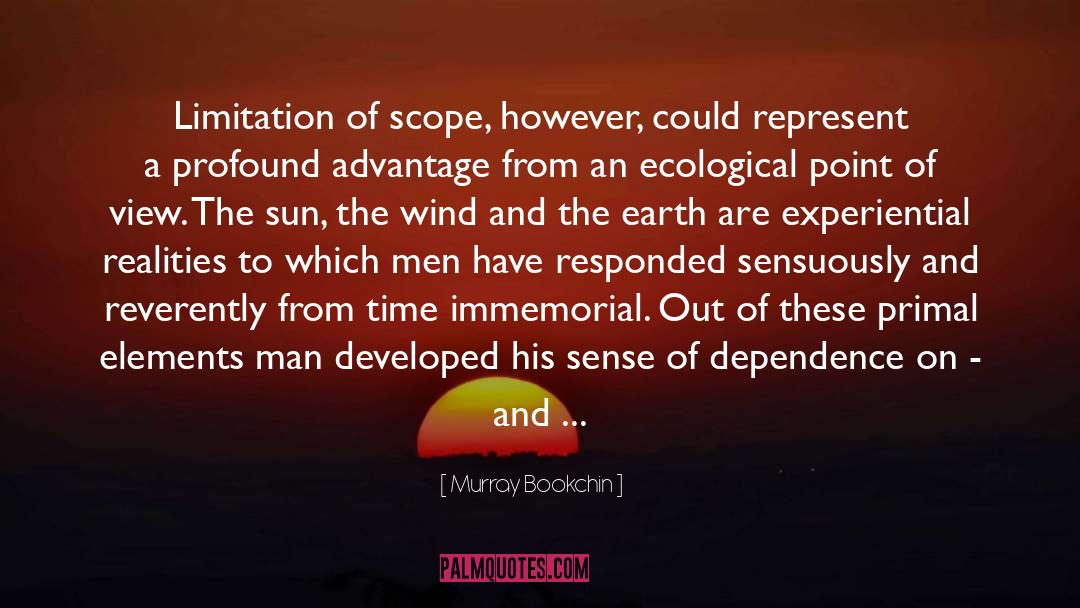
To speak of 'limits to growth' under a capitalistic market economy is as meaningless as to speak of limits of warfare under a warrior society. The moral pieties, that are voiced today by many well-meaning environmentalists, are as naive as the moral pieties of multinationals are manipulative. Capitalism can no more be 'persuaded' to limit growth than a human being can be 'persuaded' to stop breathing. Attempts to 'green' capitalism, to make it 'ecological', are doomed by the very nature of the system as a system of endless growth.
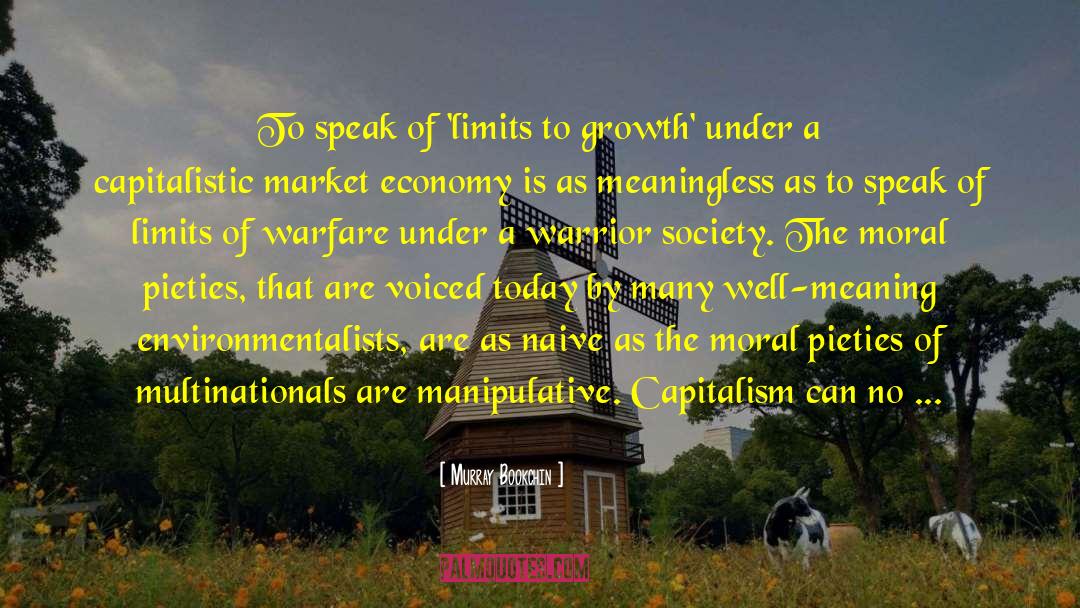
Society is ruled by the harsh maxim: "production for the sake of production." The decline from craftsman to worker, from an active to an increasingly passive personality, is completed by man qua consumer - an economic entity whose tastes, values, thoughts and sensibilities are engineered by bureaucratic "teams" in "think tanks." Man, standardized by machines, is reduced to a machine.
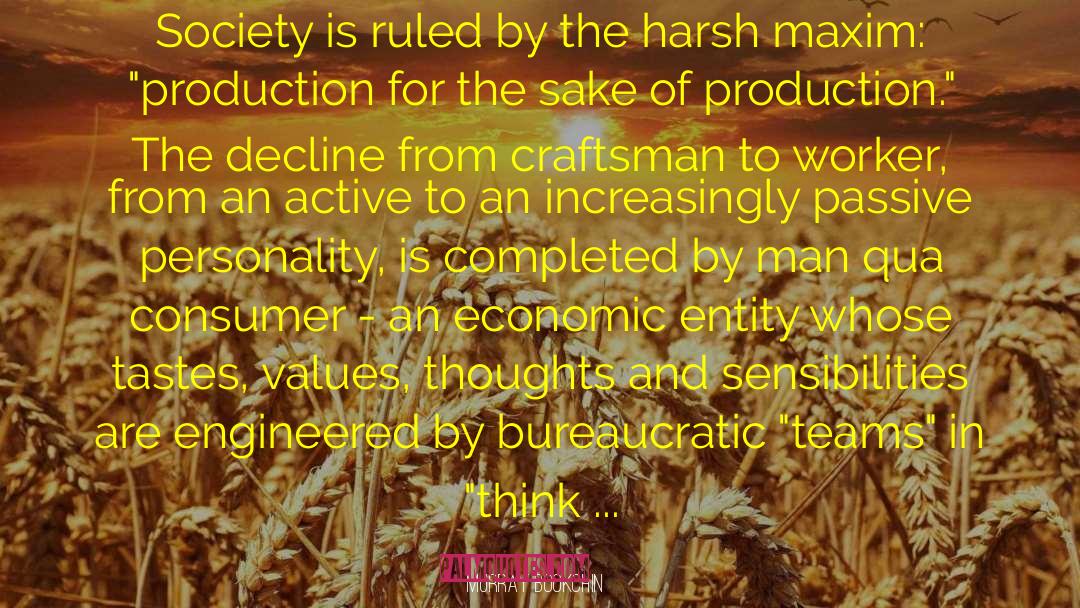
Social ecology is based on the conviction that nearly all of our present ecological problems originate in deep-seated social problems. It follows, from this view, that these ecological problems cannot be understood, let alone solved, without a careful understanding of our existing society and the irrationalities that dominate it. To make this point more concrete: economic, ethnic, cultural, and gender conflicts, among many others, lie at the core of the most serious ecological dislocations we face today - apart, to be sure, from those that are produced by natural catastrophes.

